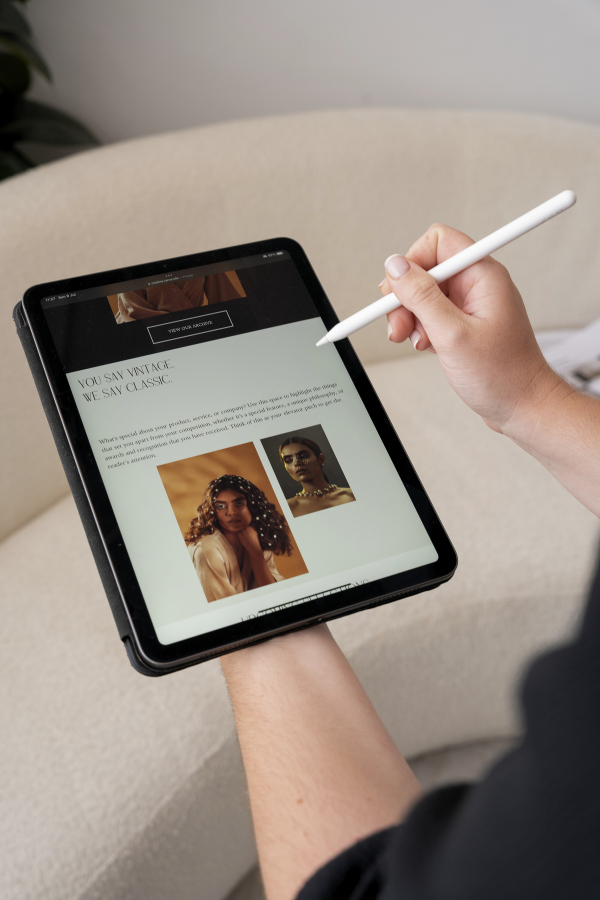

The Mid-Career Switch Series: How to Become a Brand Strategist
Summary
This article provides a comprehensive guide for those looking to transition into brand strategy mid-career. It covers essential skills, qualifications, and the importance of continuous learning and networking. Additionally, it addresses the unique challenges and opportunities faced by women in the field.
Reflection Questions
- How can your current skill set be adapted for a career in brand strategy?
- What aspects of brand strategy most interest you, and why?
- How important is networking in making a successful career switch?
Journal Prompt
Reflect on your career goals and how a switch to brand strategy might align with them. Consider the skills you possess and those you need to develop. Write about your plan to transition into this new role, including steps for education, skill enhancement, and networking.
Brand strategy is about crafting stories and experiences that really stick with people. If you’re curious about how to get into this vibrant field, especially if you’re thinking of shaking things up mid-career, you’ve landed in the right spot. From understanding the foundational aspects of brand strategy to mastering the art of continuous learning and leveraging professional networks, we’ll guide you through what it takes to thrive as a brand strategist. And because we know that switching gears career-wise can be a bit daunting (to say the least), we’ve got some special advice for all the women out there ready to jump into something new. Whether you’re contemplating a career shift or aiming to refine your expertise in brand strategy, this article is your comprehensive guide to making an impactful mark in the world of branding.
Understanding Brand Strategy


Brand strategy is the art and science of positioning a brand in the market and in the minds of consumers. Brand positioning involves a comprehensive plan that encompasses the brand’s identity, values, and promises to its customers, aiming to differentiate it from its competitors and foster a strong, emotional connection with its target audience.
A well-crafted brand strategy focuses on long-term development and sustainability, aligning the brand’s objectives with consumer needs and market trends. This strategic alignment is crucial for business success as it guides all aspects of a company’s operations, from product development to marketing and customer service, ensuring consistency and coherence in how the brand is perceived across all touchpoints.
Key Responsibilities of a Good Brand Strategist
Brand manager or brand strategist responsibilities include conducting thorough market research to understand consumer behavior, identifying competitive landscapes, and pinpointing unique value propositions that set the brand apart. Brand strategists work closely with marketing, product development, and customer service teams to ensure that the brand’s messaging and offerings resonate with its intended audience.
They are also tasked with monitoring brand performance and implementing adjustments to strategies based on market feedback and changing trends. By maintaining a pulse on both the internal alignment of the brand’s values and its external perception, brand strategists play a pivotal role in shaping a brand’s narrative and ensuring it remains relevant and appealing to its audience.
The Impact of Effective Brand Strategy Work


The impact of effective brand strategy on consumer brand perception and business growth cannot be overstated. A strong brand strategy enhances brand recognition, builds customer loyalty, and can significantly influence consumer purchasing decisions. It creates a unique brand identity that consumers can identify with, which in turn, fosters trust and loyalty.
This emotional connection not only drives repeat business but also turns satisfied customers into brand advocates who contribute to word-of-mouth marketing. From a business growth perspective, an effective brand strategy leads to increased market share, higher profit margins, and a sustainable competitive advantage. It’s a critical investment that pays dividends in enhancing the overall value of the company, driving long-term growth and success.
Why Consider a Career as a Brand Strategist?
Skyrocketing Demand for Brand Management


The demand for skilled brand strategists in today’s market is higher than ever, driven by the increasing recognition of branding as a critical component of a company’s success. In an era where consumer choices are vast and market competition is fierce, businesses seek talented individuals who can craft compelling brand stories and strategies that resonate with their target audience. Brand strategists play a crucial role in differentiating brands, articulating their unique value propositions, and positioning them effectively in the market.
This demand spans across industries, from technology and healthcare to consumer goods and services, providing a wealth of opportunities for professionals in this field. As companies strive to navigate the complexities of the digital landscape and maintain relevance, the expertise of brand strategists becomes indispensable in driving brand growth and market penetration.
Fuel your creative fire & be a part of a supportive community that values how you love to live.
subscribe to our newsletter
Opportunities for Creativity and Innovation in the Role
The role of a brand strategist offers a unique blend of creativity and innovation, appealing to those who thrive in dynamic and imaginative work environments. It is a career that challenges one to think outside the box, combining analytical skills with creative thinking to develop brand identities, narratives, and strategies that stand out. Brand strategists have the opportunity to work on diverse projects, from launching new products and entering new markets to rebranding initiatives and digital marketing strategies.
This variety not only keeps the work interesting but also allows for continuous learning and personal growth. The creative aspect of the role is complemented by the strategic need to analyze market trends, consumer behaviors, and competitive landscapes, making it a rewarding career path for individuals looking to make a significant impact through their work.
The Ability to Craft Meaningful Brand Messaging


Furthermore, the importance of brand strategists extends beyond mere market differentiation; they are pivotal in shaping consumer experiences and building brand loyalty. Through strategic storytelling and targeted branding efforts, brand strategists create emotional connections between the brand and its consumers, which are essential for cultivating loyalty.
This connection not only enhances the consumer experience but also encourages engagement and advocacy, turning customers into loyal fans and ambassadors of the brand. In today’s consumer-driven market, the ability to build and maintain these relationships is crucial for long-term success. Brand strategists, therefore, play a vital role in not just attracting customers, but also in retaining them, fostering a community around the brand, and driving sustainable business growth through loyal customer bases.
How to Become a Brand Strategist
Skills and Qualifications Needed


To excel as a brand strategist, a combination of core skills is essential, each contributing to the multifaceted nature of the role. Strategic thinking enables professionals to devise long-term plans that align with the company’s overall objectives and market opportunities, ensuring that the brand remains competitive and relevant. Creativity is equally crucial, as it allows brand strategists to think outside the conventional boundaries and come up with innovative ideas that captivate the target audience.
Analytical skills are necessary for dissecting market data, understanding consumer behavior, and gauging the effectiveness of branding strategies. Lastly, strong communication skills are indispensable for articulating brand visions, convincing stakeholders, and crafting compelling narratives that resonate with consumers. Together, these core skills form the backbone of successful brand strategy development and implementation.
Recommended Educational Background


In terms of educational background, brand strategists often come from a variety of disciplines, though degrees in marketing, business, and psychology are particularly relevant. A marketing degree provides a solid foundation in understanding consumer behavior, market research, and the principles of advertising and promotion.
A business degree equips individuals with knowledge of strategic planning, financial analysis, and operational dynamics, which are crucial for making informed branding decisions. Psychology degrees offer insights into human behavior and motivation, enabling brand strategists to design strategies that deeply connect with people on an emotional level. However, the field is also open to individuals with diverse academic backgrounds who possess a keen understanding of branding principles and the ability to apply them creatively and strategically.
Most important is continuously growing your knowledge. The field of brand strategy is dynamic, with evolving consumer preferences and technological advancements continuously reshaping the landscape. Staying abreast of industry trends, global brands, emerging content marketing tools, and best practices for keeping brand creative consistent is crucial for maintaining a competitive edge. Engaging in professional workshops, attending conferences, and pursuing advanced certifications are ways brand strategists can enhance their skills and knowledge.
Furthermore, being part of professional networks and communities provides invaluable opportunities for collaboration, mentorship, and exposure to diverse perspectives. Continuous education not only enriches a brand strategist’s expertise but also fuels innovation and adaptability, key attributes for thriving in this ever-changing field.
Gaining Relevant Experience


Gaining relevant experience is a critical step on the path to becoming a brand strategist, offering practical insights and skills that are invaluable in this career. Internships, in particular, provide a unique opportunity to work closely with experienced brand strategists, understand the day-to-day challenges they face, and learn how strategic decisions are made and implemented. Volunteering for marketing or branding projects for non-profits or startups can also offer hands-on experience, allowing aspiring brand strategists to apply theoretical knowledge in real-world settings. A
dditionally, seeking out job roles that touch on aspects of branding, such as marketing coordination, content creation, or market research, can help build a foundational skill set. These experiences are not only crucial for understanding the nuances of brand strategy but also provide tangible achievements and learnings to discuss in job interviews.
Building a Personal Brand
Building a personal brand is another vital step that serves multiple purposes for aspiring brand strategists. It demonstrates their understanding of brand strategy principles through the lens of marketing themselves. Engaging in personal projects, such as running a blog, managing a social media campaign, or even creating an online portfolio, allows individuals to apply branding concepts creatively and strategically. This hands-on approach to personal branding not only sharpens one’s skills but also showcases their expertise and style to potential employers or clients.
Moreover, an effective personal brand can open doors to networking opportunities, attract mentorship, and even draw in freelance projects. In essence, by curating a personal brand that reflects their unique perspective and skills in brand strategy, individuals not only enhance their visibility in the field but also reinforce their credibility as emerging professionals in brand strategy.
Transitioning Mid-Career: A Guide for Women


Ready to become a brand strategist? For women considering a mid-career transition into brand strategy, the first step involves a thorough assessment of their current skill set to determine how it aligns with the demands of brand strategy. Many skills acquired in various professions, such as analytical thinking, creative problem-solving, project management, and effective communication, are highly transferable and valuable in the field of brand strategy.
This introspective process allows individuals to identify their strengths and areas for development, providing a clear starting point for the transition. Additionally, understanding the core competencies required for success in brand strategy enables individuals to tailor their learning and development efforts, ensuring they are well-equipped to make a meaningful impact in their new career.
Overcoming Fears and Embracing Change


The psychological journey of changing careers mid-life can be both challenging and exhilarating. Fear of the unknown, potential financial instability, and the prospect of starting over in a new field can be daunting. However, embracing this change requires a mindset shift, viewing the transition as an opportunity for growth and self-discovery rather than a setback.
It’s crucial for individuals to acknowledge their fears, yet also to focus on the potential for personal fulfillment and professional achievement that a career in brand strategy can offer. Building resilience, seeking out motivational stories of career change, and setting realistic, incremental goals can help mitigate these fears and foster a positive outlook towards the career transition process.
Finding Support Through Networking and Mentorship
Networking and mentorship are invaluable resources for women transitioning into brand strategy mid-career. Engaging with a community of like-minded professionals and seeking guidance from experienced brand strategists can provide support, inspiration, and practical advice. Many cities and online platforms offer networking groups, professional associations, and events dedicated to marketing and brand strategy, offering ample opportunities to connect and learn from others in the field.
Mentorship, in particular, can offer personalized insights and encouragement, helping individuals navigate the nuances of the industry, refine their skill sets, and identify opportunities for growth and advancement. By leveraging these networks, women can build confidence, gain industry knowledge, and accelerate their transition into a successful career in brand strategy.
Final Thoughts on Thriving as a Brand Strategist


Thriving as a brand strategist in the fast-paced and ever-evolving world of marketing requires a commitment to continuous learning and staying abreast of industry trends. The digital landscape, consumer behaviors, and competitive strategies are in a constant state of flux, necessitating brand strategists to keep their knowledge and skills sharp.
Engaging in ongoing education through online courses, webinars, and industry conferences can provide insights into the latest tools, technologies, and methodologies. This dedication to learning ensures that brand strategists can develop innovative and effective strategies that resonate with target audiences and anticipate market shifts. By fostering a mindset of curiosity and adaptability, professionals can not only respond to changes more effectively but also position themselves as thought leaders in their field.
Building a robust professional network is another cornerstone of success for brand strategists. Joining professional networks and associations specifically tailored to brand strategists offers numerous benefits, including access to a community of peers for exchange of ideas, collaboration opportunities, and potential mentorship relationships. These organizations often host events, workshops, and seminars that can further one’s professional development and understanding of the field.
Additionally, involvement in such groups can enhance one’s visibility within the industry, opening doors to career advancement opportunities. Networking, both online and in person, enables brand strategists to share experiences, challenges, and successes, fostering a supportive environment conducive to growth and innovation.
A Few Work-Life Rhythm Tips to Keep You Sane


For women in the brand strategy field, maintaining a healthy work-life rhythm is essential for long-term success and personal well-being. Navigating the demands of a high-stakes, creative profession while managing personal responsibilities requires effective time management and boundary-setting skills. Prioritizing tasks, delegating when possible, and leveraging technology to streamline workflows can help alleviate pressure and create space for rest and rejuvenation.
Additionally, cultivating hobbies and interests outside of work not only provides a much-needed counterbalance to professional obligations but also can inspire new perspectives and ideas beneficial to one’s work. Embracing flexibility, where possible, and advocating for a supportive work environment are also key strategies. By acknowledging the importance of a balanced life, women in brand strategy can enjoy a fulfilling career and personal life, enhancing their creativity, productivity, and overall job satisfaction.
Design Dash
Join us in designing a life you love.
-
All About Our 7-Day Focus & Flex Challenge
Sign up before August 14th to join us for the Focus & Flex Challenge!
-
Unique Baby Names Inspired by Incredible Women from History
Inspired by historic queens, warriors, artists, and scientists, one of these unusual baby names might be right for your daughter!
-
Finding a New 9 to 5: How to Put Freelance Work on a Resume
From listing relevant skills to explaining your employment gap, here’s how to put freelance jobs on your resume.
-
What is Generation-Skipping, and How Might it Affect Sandwich Generation Parents?
The emotional pain and financial strain of generation skipping can be devastating for Sandwich Generation parents.
-
Four Material Libraries Dedicated to Sustainability, Preservation, and Education
From sustainable building materials (MaterialDriven) to rare pigments (Harvard), each materials library serves a specific purpose.
-
Do You Actually Need a Beauty Fridge for Your Skincare Products? (Yes and No.)
Let’s take a look at what dermatologists and formulators have to say about whether your makeup and skincare belong in a beauty fridge.








